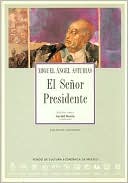

 |

|

The average rating for El Senor Presidente based on 2 reviews is 4.5 stars.
Review # 1 was written on 2012-07-14 00:00:00 Peter Taylor Peter TaylorEl Señor Presidente = Mister President = The President, Miguel Ángel Asturias Mister President is a 1946 novel written in Spanish, by Nobel Prize-winning Guatemalan writer and diplomat: Miguel Ángel Asturias (1899-1974). A landmark text in Latin American literature, Mister President explores the nature of political dictatorship and its effects on society. Asturias makes early use of a literary technique now known as magic realism. One of the most notable works of the dictator novel genre, Mister President developed from an earlier Asturias short story, written to protest social injustice in the aftermath of a devastating earthquake in the author's home town. تاریخ نخستین خوانش: روز نهم ماه نوامبر سال 1972میلادی و بار دیگر سال 1999میلادی عنوان: آقای رئیس جمهور؛ میگل آنجل آستوریاس؛ مترجم: زهرای خانلری (کیا)؛ تهران، خوارزمی، 1348، در 408ص، موضوع داستانهای نویسندگان گواتمالایی به زبان اسپانیایی - سده 20م موضوع داستان، رئیس جمهور «استرادا گابررا»، دیکتاتور خشن «گواتمالا»، در نخیتبن سالهای سده بیستم میلادی است؛ رئیس جمهوری که خود را خدای مردمان آن کشور میداند، و بجای مردمان کشور خود، و برای آنها تصمیم گیری نیز میکند؛ حکومتی که برهان نارضایتی از: «شجاعت»، و «باورهای افراد ویژه»، انواع و اقسام جرمها را، به آنها نسبت میدهد؛ محکومین، و شاهدهای رویدادهای مختلف را در زندان، به زور شکنجه، مجبور به اعترافات دلخواه خویش میکند و ....؛ در این داستان سیاست، و اختناق، خوانشگر شاهد یک عشق، و سرانجام آن، در چنان حکومتی نیز هست؛ آقای «استوریاس» داستان را با شیوه های خیال آمیز، و شاعرانه با روایتی بسیار زیبا بازگو کرده است تاریخ بهنگام رسانی 25/09/1399هجری خورشیدی؛ ا. شربیانی |
Review # 2 was written on 2020-04-17 00:00:00 Ilari Aro Ilari AroI read the English translation of this Spanish language novel, which was published in 1946. I broke off reading it about halfway through to better understand the background, and it seems the title character is based on the real-life Manuel Estrada, President of Guatemala from 1898 to 1920. I'd not heard of him before. The story is set during the 1910s. I've read a number of novels by Latin American authors where the reader is taken into a sort of nightmare world, and this is another to add to that list. It seems to me the author wanted to illustrate the effects of dictatorship on society, especially the effects produced by the sort of dictator with which Latin America has historically been so cursed. In this novel the merest chance can lead to someone being tortured or executed, and the society is a sort of kleptocracy where those in power extort money from everyone else. Cruelty and fear are the dominant themes, and people are cruel to one another in the most casual fashion. Others are driven by fear to disown friends and relatives who have been arrested, terrified they will be tarred by association. There are one or two characters who behave with decency, but they are the exceptions. Many of the male characters spend their time getting blindingly drunk. Apparently alcoholism really was a major problem in Guatemala at this time, but I get the feeling the author's message is that the rottenness of the society he describes was something that originated at the top and spread downwards. Despite the book's title, the President is not the main character, that role falling to someone with the curious moniker of "Miguel Angel-Face", an advisor to the President. Several times his name is linked with the phrase "He was as beautiful and as wicked as Satan". I found this a curious expression and wondered whether there was something to it that was lost either in translation or across the gaps of time and place. Despite the comparison with old Beelzebub, Miguel is one of the book's more sympathetic characters. He falls in love with the daughter of one of the President's political opponents and becomes a better person as a result. "Magic realism" is another well-known feature of Latin American literature and this novel was one of the early examples of that genre. It isn't always a style that I appreciate but it's comparatively restrained in this novel. Most of the dream like sequences are identified as dreams. There are a few mystical elements based around aspects of Catholicism. Is it hope or depravity that triumphs? It's a question I would enjoy discussing, and I rate a novel a success when it leaves me with the desire to discuss it with others. However, to take that discussion further in this review would be to include spoilers. |
CAN'T FIND WHAT YOU'RE LOOKING FOR? CLICK HERE!!!